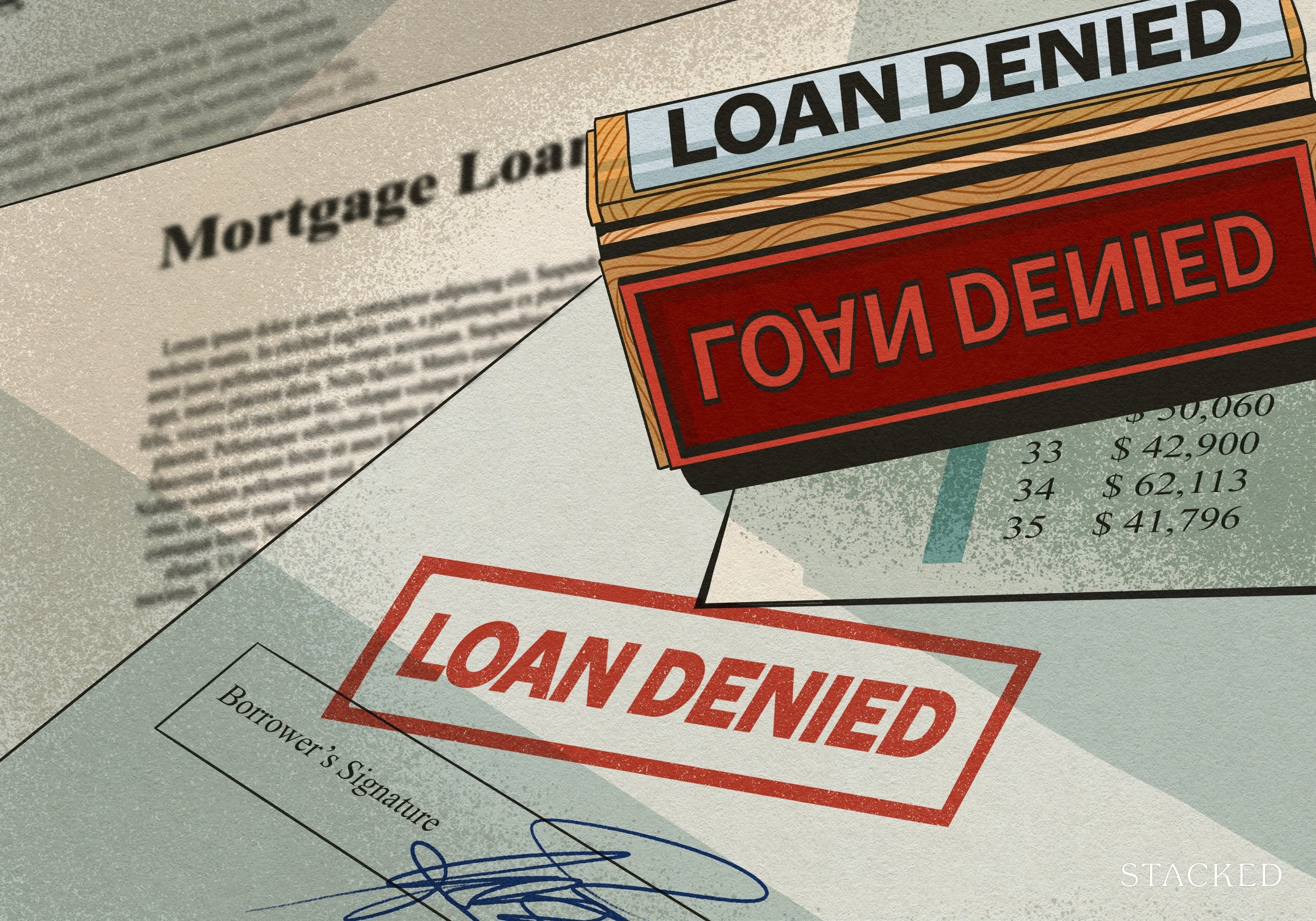How My Home Loan In Singapore Was Rejected (And How I Fixed It)
December 14, 2024

It’s not just the festive season, it’s also home loan season: with interest rates cooling a bit, quite several Singaporeans are seeking to refinance into cheaper mortgages. At the same time, we’re seeing strong transaction volumes as condo sales pick up. For those of you struggling with home loan applications, or may need a mortgage in the coming year, here are some experiences from borrowers:
So many readers write in because they're unsure what to do next, and don't know who to trust.
If this sounds familiar, we offer structured 1-to-1 consultations where we walk through your finances, goals, and market options objectively.
No obligation. Just clarity.
Learn more here.
1. Forgot all about being listed as a shareholder/director for a family member’s business
LM was a first-time homebuyer in 2011 and recalls she had to be excluded as a borrower. For a time, her husband had to take on the whole loan.
She went to two banks initially and her loan application failed both times:
“I am not a person who uses loans,” LM said, “All my credit cards are just for miles only, after I use them I pay it back right away. I’ve never owed money my whole life. So we were confused why we kept getting rejected. In the end I got my credit report to check, and I got a shock. There was a code on it, and they told me it means I had been in default. But I never even borrowed any money, so how was it possible?”
LM says she spent hours checking and re-checking her mail and messages and calling her banks. In the end, the issue turned out to be a favour she had done for a family member, a few years prior.
“I helped to put my name on something, to be some shareholder, director, secretary, whatever. I don’t remember the details. I was so stupid, I just trusted because it’s my own family that needed help. They said there was no need to pay any money or anything, just sign; like being a witness.”
As it turned out, it was nothing like just being a witness. When the company was in a crisis, LM’s name got dragged into the situation. However because her family members mostly kept business details to themselves, they never communicated any issues to LM. She didn’t even know about the company’s near-insolvency, which would take a few years to recover from.
“Maybe they genuinely didn’t know I would be affected, but I was still angry of course. I told them, now I cannot buy my own house, because I did you a favour.”
LM later found a mortgage broker to help. As the situation with the company couldn’t be cleared up quickly, a decision was made to put the entire loan under LM’s husband’s name. LM would then contribute her share of the mortgage separately.
It was a close shave though: had it happened two years later, the solution might now have worked:
“In 2013 we had the TDSR*. If they had it in 2011, we would have needed to put down a much bigger down payment, because the loan was under my hubby’s name only. We might have had to postpone our purchase.”
*The Total Debt Servicing Ratio (TDSR) limits the monthly home loan repayment to 55 per cent of the borrowers’ monthly income. Failure to meet the TDSR would mean having to stretch the loan tenure, or make a bigger down payment, until the TDSR limit is met.
2. Trying to use other loan facilities to cover the down payment

When Max applied for a home loan, he was interested in minimising his initial cash outlay. This was at a time when his business was in its infancy, and he was looking to put more capital into it.
“I did do my homework but I didn’t do it properly,” Max says, “I talked to some property agents and they showed me the numbers, so I recorded the down payment and stamp duty and all that. Then I asked for a separate loan for the down payment, but I was told it’s not allowed.”
More from Stacked
4 Reasons Why Alexandra May Just Be The Next Hottest BTO Launch Site
Getting a good BTO flat location is a proven windfall; and demand for PLH sites, even with all their restrictions,…
(Under MAS Notice 632, it is illegal for banks to provide loans for covering residential property down payments).
“So I tried to be a smart aleck, I opened a line of credit, and I borrowed the amount I needed for the down payment. Then I applied for the home loan a whole after that. I thought maybe the loan wouldn’t be reflected yet, when they checked my credit”
This turned out to be a miscalculation, as the large loan was in fact reflected in Max’s credit. On top of that, he had outstanding loans related to his business, which he also feels added to the issue.
Fortunately, the mortgage banker understood the situation, and was able to help resolve the issue – but it did result in Max making a bigger down payment, thus defeating his original intent anyway. On top of this, Max says he lost more money, as he now has two loans – and the line of credit has a higher interest rate.
From his perspective:
“I’ve learned that knowing a little bit is more dangerous than knowing nothing. When it comes to these sorts of things, don’t just know a little bit then try to find a way around the system. Either make sure you 100 per cent know a lot, or just treat it as if you know nothing at all. Then leave it to the experts.”
3. Qualified for a loan before, but not today

Quan got her home loan way back in 2018, when she bought a two-bedder for herself; but she recently had trouble with refinancing. She says that:
“During Covid my company had to downsize. While they couldn’t save my job, they offered me a contract instead. So I would be working for myself, and I would be paid based on their project outcomes. Because job hunting was so hard since Covid, I ended up doing that all the way up till now.”
Unfortunately, this change in income caused issues with the TDSR (see above). When Quan tried to refinance her home loan to a cheaper package, she opted for a wholly different bank. This meant having to go through the same screening for the application process, all over again.
“I applied through a loan comparison website. Their people helped me with the paperwork but they told me it couldn’t go through – because now I was on variable income, so there was a haircut applied to my earnings. Also I was earning a lot less than before, as there’ve been very few projects over the past two years; we’re only just now starting to pick up the pace.”
For the time being, Quan hasn’t got any option but to stay with her loan package, and pay a higher interest rate. However, she’s been told she should be able to try again with fewer issues in the coming year, as she’s taking on a new salaried role soon.
If you’re experiencing problems with your home loan, you can reach out to us at Stacked for help. In the meantime, do remember not to put down booking or option fees if you haven’t secured a loan yet – you could end up forfeiting a painful amount.
At Stacked, we like to look beyond the headlines and surface-level numbers, and focus on how things play out in the real world.
If you’d like to discuss how this applies to your own circumstances, you can reach out for a one-to-one consultation here.
And if you simply have a question or want to share a thought, feel free to write to us at stories@stackedhomes.com — we read every message.
Ryan J. Ong
A seasoned content strategist with over 17 years in the real estate and financial journalism sectors, Ryan has built a reputation for transforming complex industry jargon into accessible knowledge. With a track record of writing and editing for leading financial platforms and publications, Ryan's expertise has been recognised across various media outlets. His role as a former content editor for 99.co and a co-host for CNA 938's Open House programme underscores his commitment to providing valuable insights into the property market.Need help with a property decision?
Speak to our team →Read next from Homeowner Stories

Homeowner Stories We Could Walk Away With $460,000 In Cash From Our EC. Here’s Why We Didn’t Upgrade.

Homeowner Stories What I Only Learned After My First Year Of Homeownership In Singapore

Homeowner Stories I Gave My Parents My Condo and Moved Into Their HDB — Here’s Why It Made Sense.

Homeowner Stories “I Thought I Could Wait for a Better New Launch Condo” How One Buyer’s Fear Ended Up Costing Him $358K
Latest Posts

Editor's Pick These Freehold Condos Near Orchard Haven’t Seen Much Price Growth — Here’s Why

Singapore Property News These 4 Freehold Retail Units Are Back On The Market — After A $4M Price Cut

Pro This 130-Unit Boutique Condo Launched At A Premium — Here’s What 8 Years Revealed About The Winners And Losers





































0 Comments